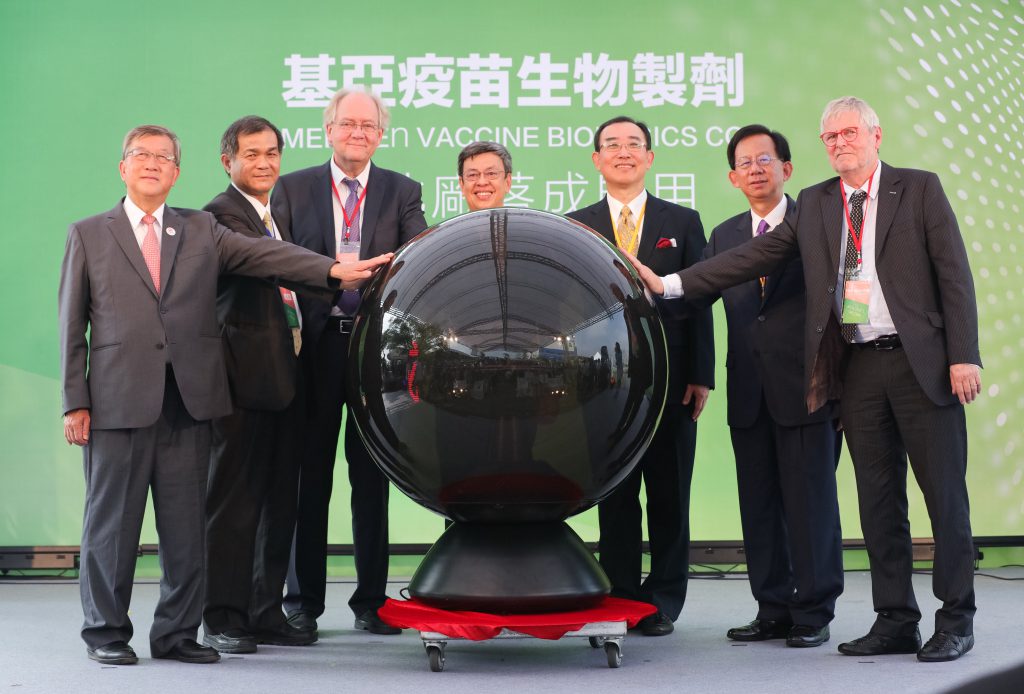On October 26th , Medigen Vaccine Biologics. Co (MVC) inaugurates Taiwan’s first cell-based vaccine manufacturing plant, which is located in Hsin-chu Biomedical Science Park in northern Taiwan. In the opening ceremony, more than 300 distinguished guests from government, academic, and pharmaceutical industries were invited, including Taiwan’s Vice President Chen Chien-jen, UCAB chairman Dr. Han Bosch, Minister of Science and Technology Yang Hung-Duen, Magistrate of Hsinchu County Chiu Ching-chun, Deputy Minister of TFDA Ho Chi-Kung, and Director of CDC Chou, Jih-Haw.
In his opening remarks, Vice President Chen Chien-Jen addressed the importance of vaccine self-sufficiency and pointed out that in current Taiwan’s vaccine market, only 8% is locally produced, while the rest rely on importation. Therefore, “the completion of MVC’s vaccine manufacturing factory marks a milestone that reflects Taiwan’s capability of infection prevention and control”, said the Vice President.
MVC develops vaccines and biosimilar monoclonal antibodies to prevent regional infectious diseases like enterovirus (EV71), dengue, H7N9, H5N1, and respiratory syncytial virus (RSV). To expand production capacity, MVC invested 1.5 billion TWD to construct Taiwan’s first privately-owned, PIC/S-GMP compliant vaccine and biologics manufacturing factory.
MVC develops innovative vaccines and biosimilar mAbs
Earlier this year MVC completed phase 2 clinical trial subject recruitment of its EV71 vaccine, which is the first EV71 vaccine in the world that covers 2-6 months old babies. The population is reported to have the highest “relative case fatality rate” among all age group. Furthermore, MVC’s EV71 vaccine is the first product using a booster dose to extend protection later into life. Once MVC’s vaccine hit the market, it will provide longer protection to target subjects, including the most vulnerable population, thus eradicate the disease through the effect of herd immunity. MVC is planning to initiate multi-regional clinical trial (MRCT) in Taiwan and South-East Asia next year to speed up approvals in target markets.
Besides EV71 vaccine, MVC develops two types of dengue vaccines to fulfill current and future medical needs. MVC collaborates with US NIH to develop live attenuated dengue vaccine covering subjects over 65 years old. MVC also joins forces with US CDC to develop virus-like-particle (VLP) dengue vaccine to provide broader protection. MVC and US CDC will complete early-stage research in United States and transfer all technologies to MVC’s Hsin-chu factory to complete process development, clinical trials and commercial manufacturing.
Other than vaccines, MVC announced the collaboration with WHO/UCAB consortium earlier this year to develop biosimilar palivizumab, a monoclonal antibody against respiratory syncytial virus, which is a major cause of lower respiratory tract infections during infancy and childhood. The consortium is constituted by four regional vaccine players mAbXience, Libbs, MVC and SPIMACO. Each member will share the development cost, thus offer the drug in lower price for developing countries.
The inauguration ceremony is just a beginning. MVC will continue develop innovative vaccines and available biosimilar antibodies to protect people from emerging infectious diseases and improve global health.

Key speakers in inauguration ceremony (from left to right):Magistrate of Hsinchu County Chiu Ching-chun,、Minister of Science and Technology Yang Hung-Duen, UCAB Chairman Dr.Han Bosch、Taiwan’s Vice President Chen Chien-jen, 、MVC CEO Stanley Chang, and MVC exectutive CEO Charles Chen, NNE Pharmaplan Klaus Hermansen.

